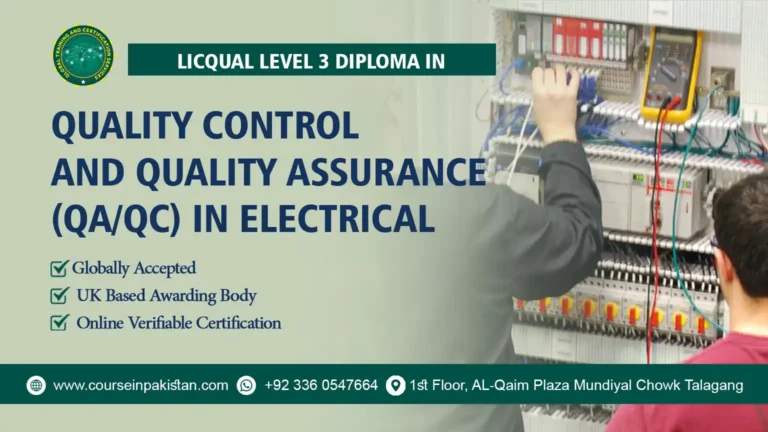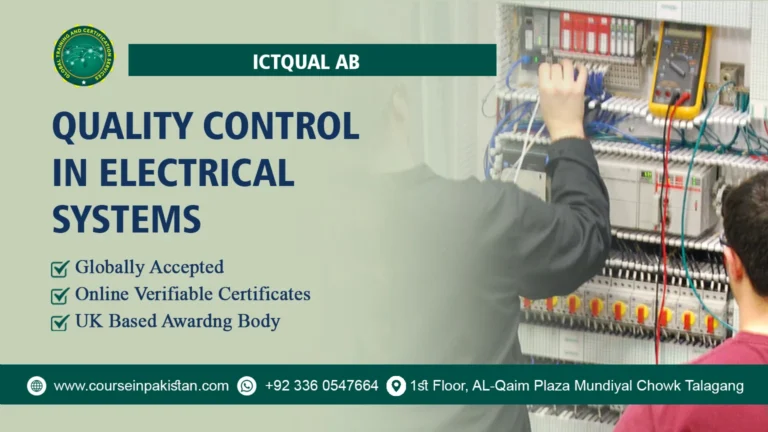
Level 1 Diploma in Quality Control (QC)
“Empowering Futures through Excellence in Quality Control – Level 1”
Are you ready to take your career to new heights? Dreaming of a future filled with exciting opportunities, impressive job titles, and a steady climb up the corporate ladder? Look no further – the Level 1 Diploma in Quality Control is your passport to success!
Why Choose Level 1 Diploma in Quality Control (QC)
- Foundation of Quality Expertise: This diploma serves as the fundamental building block for individuals aspiring to excel in the field of quality control. It provides you with a solid foundation in quality management principles, methodologies, and practices.
- Career Advancement: Quality control is a critical function in various industries, including manufacturing, healthcare, and technology. Completing this diploma program can significantly enhance your career prospects and open up new job opportunities.
- Industry-Relevant Skills: The curriculum is designed to equip you with practical, hands-on skills that are directly applicable to real-world quality control scenarios. You’ll learn how to identify defects, analyze data, and implement quality improvement strategies.
- Quality Assurance: Quality control is essential for ensuring that products and services meet or exceed customer expectations. By earning this diploma, you’ll be better prepared to contribute to your organization’s quality assurance efforts, resulting in improved customer satisfaction and brand reputation.
- Entry-Level Access: The Level 1 Diploma is an excellent starting point for those who are new to quality control. It doesn’t require prior experience in the field, making it accessible to a wide range of individuals seeking to enter this profession.
Your Future Awaits – Enroll Today!
The Level 1 Diploma in Quality Control (QC) is an introductory certification program designed to provide individuals with fundamental knowledge and skills related to quality control processes in various industries. This diploma program serves as a foundational course, typically offered by vocational schools, community colleges, or online educational platforms, to prepare students for entry-level positions in quality control and quality assurance.
The Level 1 Diploma in Quality Control (QC) offers numerous benefits to individuals seeking to enhance their skills and knowledge in the field of quality control and quality assurance. Here are some of the key benefits:
- Introduction to QC Principles: The Level 1 Diploma provides a foundational understanding of quality control principles, helping participants grasp the basics of maintaining and improving product or service quality.
- Career Advancement: Completing this diploma can open up entry-level job opportunities in various industries, including manufacturing, healthcare, and technology, allowing individuals to embark on a career in quality control.
- Skill Development: Participants develop essential skills such as data analysis, inspection techniques, and process improvement, which are highly valuable in quality control roles.
- Quality Improvement: With the knowledge gained from this diploma, individuals can actively contribute to enhancing product or service quality within their organization, leading to increased customer satisfaction and business success.
- Industry-Relevant Curriculum: The curriculum is designed to align with industry standards and best practices, ensuring that graduates are well-prepared for real-world quality control challenges.
- Problem-Solving Abilities: Participants learn how to identify and address quality issues effectively, which is critical in preventing defects and reducing waste in production processes.
- Documentation and Reporting: Understanding how to document quality data and create reports is a fundamental skill in QC, and this diploma equips individuals with the necessary knowledge in this area.
- Quality Assurance Knowledge: The Level 1 Diploma covers the basics of quality assurance, helping individuals understand the broader context of quality control within an organization.
- Versatile Skill Set: The skills acquired in this program are transferable across different industries, allowing individuals to explore various career paths within quality control and related fields.
- Professional Recognition: Completing a Level 1 Diploma in QC can be seen as a valuable achievement on a resume, potentially leading to better job opportunities and higher earning potential.
- Personal Growth: Beyond the professional benefits, this diploma can contribute to personal growth by instilling a commitment to quality, attention to detail, and a sense of responsibility in individuals.
- Preparation for Advanced Studies: For those interested in pursuing further education in quality management or related fields, this diploma serves as a solid foundation for higher-level qualifications.
Upon successful completion of this program, learners will have achieved the following learning to :
- Fundamental Quality Concepts:
- Define and explain basic quality control terminology and concepts.
- Understand the importance of quality in various industries.
- Quality Control Tools:
- Identify and utilize common quality control tools such as checklists and flowcharts.
- Apply these tools to identify defects and deviations in processes.
- Documentation and Record Keeping:
- Create and maintain quality control documents and records.
- Ensure documentation complies with industry standards and regulations.
- Product Inspection:
- Perform basic product inspections using visual and dimensional inspection techniques.
- Recognize common defects and discrepancies in products.
- Statistical Sampling:
- Understand the principles of statistical sampling methods.
- Apply sampling techniques to assess product quality.
- Root Cause Analysis:
- Analyze quality issues to identify root causes.
- Develop solutions to prevent the recurrence of quality problems.
- Communication Skills:
- Effectively communicate quality-related information to team members and stakeholders.
- Collaborate with others to address quality issues and implement improvements.
- Safety and Compliance:
- Comply with safety regulations and quality control standards.
- Promote a culture of safety and quality within the workplace.
- Problem Solving and Decision Making:
- Use critical thinking skills to solve quality-related problems.
- Make informed decisions to improve processes and product quality.
- Ethical Considerations:
- Understand and adhere to ethical standards in quality control.
- Demonstrate integrity and professionalism in all quality-related activities.
- Continuous Improvement:
- Recognize the importance of continuous improvement in quality control.
- Participate in and contribute to quality improvement initiatives.
- Quality Control Documentation:
- Create and interpret quality control documentation, including control charts and process maps.
- Utilize documentation to monitor and enhance quality control processes.
A Level 1 Diploma in Quality Control (QC) is an essential credential for individuals aspiring to enter the field of quality control and assurance. Here are some compelling reasons why you should consider pursuing this diploma:
- Foundation of Knowledge: The Level 1 Diploma in QC provides a solid foundation of knowledge and skills in quality control principles and practices. It equips you with the fundamental concepts and tools needed to excel in this field.
- Career Opportunities: Quality control is a critical aspect of many industries, including manufacturing, healthcare, automotive, and more. Completing this diploma opens doors to a wide range of career opportunities in various sectors.
- Job Security: As organizations continue to prioritize quality in their products and services, the demand for qualified quality control professionals remains steady. This diploma can provide you with job security and stability in your career.
- Competitive Advantage: Having a Level 1 Diploma in QC sets you apart from other job applicants. It demonstrates your commitment to quality and your readiness to contribute effectively to an organization’s quality management efforts.
- Skill Development: During the course of this diploma, you will acquire valuable skills in data analysis, problem-solving, and process improvement. These skills are not only applicable to quality control but also transferable to other areas of your career.
- Career Progression: If you plan to advance in your quality control career, the Level 1 Diploma can serve as a stepping stone. It provides a strong basis for pursuing higher-level certifications and degrees in quality management.
- Contribution to Excellence: Quality control professionals play a crucial role in ensuring that products and services meet or exceed customer expectations. By pursuing this diploma, you contribute to the culture of excellence and continuous improvement within your organization.
- Personal Satisfaction: Knowing that you are instrumental in maintaining high standards of quality can be personally satisfying. It allows you to take pride in your work and its positive impact on the products or services you help produce.
- Global Recognition: Quality control standards and practices are recognized and valued worldwide. Holding a Level 1 Diploma in QC can open doors to job opportunities not only in your home country but also internationally.
Course Contents of Level 1 Diploma in Quality Control (QC)
Module 1: Introduction to Quality Control
- The Role of Quality Control in Industries
- Historical Overview of Quality Control
- Quality Control vs. Quality Assurance
Module 2: Basic Quality Concepts
- Fundamental Quality Characteristics and Attributes
- Common Quality Terminology
- Cost of Poor Quality
Module 3: Quality Control Tools and Techniques
- Statistical Process Control (SPC)
- Root Cause Analysis (RCA)
- Failure Mode and Effects Analysis (FMEA)
- Pareto Analysis
- Control Charts, Histograms, Scatter Plots, and Other Graphical Tools
Module 4: Quality Standards and Regulations
- Industry-Specific Quality Standards (e.g., ISO 9001, AS9100)
- Regulatory Compliance and Quality
- Quality Auditing and Compliance Management
Module 5: Quality Inspection and Testing Methods
- Inspection Techniques and Procedures
- Sampling Plans (e.g., AQL)
- Precision Measurement and Testing Equipment
- Calibration and Validation
Module 6: Quality Management Systems (QMS)
- Introduction to Quality Management Systems
- Six Sigma and Lean Principles
- Total Quality Management (TQM)
- Continuous Improvement and Kaizen
Module 7: Advanced Problem-Solving
- Six Sigma DMAIC (Define, Measure, Analyze, Improve, Control) Methodology
- 8D Problem-Solving Process
- Advanced Root Cause Analysis Techniques
Module 8: Statistical Analysis in Quality Control
- Hypothesis Testing
- Regression Analysis
- Design of Experiments (DOE)
- Statistical Software Applications
Module 9: Quality Control Documentation and Reporting
- Record Keeping and Documentation Requirements
- Audit Planning and Execution
- Effective Reporting of Quality Control Findings
Module 10: Quality and Safety Integration
- The Interplay between Safety and Quality
- Ensuring Safe Quality Control Practices
- Risk Assessment and Safety in Quality Control
Module 11: Quality Assurance and Continuous Improvement
- Quality Assurance Principles
- Building a Culture of Continuous Improvement
- Benchmarking and Best Practices
The Level 1 Diploma in Quality Control (QC) is designed for individuals who want to begin their journey in the field of quality control. This course is suitable for:
- Entry-Level Professionals: If you are new to the field of quality control and are looking to establish a foundation in this area, the Level 1 Diploma is an excellent starting point.
- Career Changers: If you are considering a career change and are interested in pursuing opportunities in quality control, this course can help you acquire the fundamental knowledge and skills needed for this field.
- High School Graduates: Recent high school graduates who are exploring career options and are interested in quality control as a potential career path can benefit from this introductory course.
- Manufacturing and Production Workers: Individuals already working in manufacturing or production roles who wish to enhance their skills and move into quality control positions will find this course valuable.
- Quality Control Assistants: If you are currently working as a quality control assistant or in a similar role and want to formalize your knowledge and skills, this diploma program can be a stepping stone to advance in your career.
- Anyone Interested in Quality Improvement: Individuals who are passionate about improving product and service quality across various industries can use this course to gain a better understanding of quality control principles.
Entry Requirements for the Level 1 Diploma in Quality Control (QC) Course
To ensure that participants can effectively engage with and benefit from the Level 1 Diploma in Quality Control (QC) course, we have established the following entry requirements:
- Educational Background: Typically, participants should have a high school diploma or its equivalent (such as a GED). Some programs may require a minimum level of education, such as completion of secondary education, to ensure participants have basic academic skills.
- Language Proficiency: Proficiency in the language of instruction (usually English) is essential to comprehend complex course materials, actively participate in discussions, and complete written assignments.
- Age Requirement: Participants must be at least 18 years of age to enroll in this course.
- Industry Experience: While not always required, some programs may prefer or recommend that participants have some prior industry experience related to the field they intend to study. This can provide valuable context for understanding quality control principles.
To take admission in Based Computer course, Please visit our institute
Global Training and Certification Services
1st Floor, Al-Qaim Plaza, Mundiyal Chowk, Talagang
For any query or detailed information please call us on
+92-336-054 7664
For WhatsApp Please






